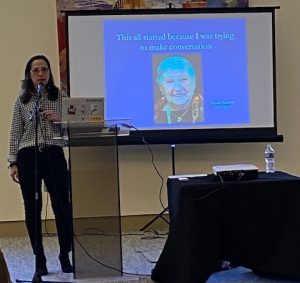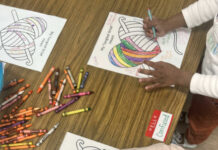Jennifer Mendelsohn is something of a star in the field of genealogy.

The Mount Washington resident attained national renown as a genealogy guide to Dani Shapiro, author of “Inheritance,” whose DNA test results triggered the discovery that her biological father was a non-Jewish sperm donor. Mendelsohn gained further attention on the national level through her project, Resistance Genealogy, in which she researches and publicizes the family immigration histories of prominent anti-immigrant figures, including political commentators Tucker Carlson and Tomi Lahren; Rep. Steve King of Iowa; and Stephen Miller, former President Donald Trump’s policy adviser. Her expertise is also shared regularly with two Jewish genealogy groups on Facebook — Jewish DNA for Genetic Genealogy and Family Research, and Tracing the Tribe — each with an international membership of thousands. She is also a leader of the Jewish Genealogy Society of Maryland.
But, according to a talk Mendelsohn gave on April 2 at her own congregation, Bolton Street Synagogue, she knew nothing about genealogy until 10 years ago.
During her talk, she described her first encounter with genealogy as an accident. During an unrelated Google search, she stumbled upon the 1940 census, which she had not even realized was available to the public. Two weeks later, Mendelsohn took the plunge into genealogy with her husband’s grandmother, Frieda Pertman, a Holocaust survivor from Poland who had lost basically her entire family in the Holocaust. Pertman remembered that she had two aunts who had emigrated to the United States before World War I, possibly to Chicago, but she didn’t know much about them other than their first names. Eventually, by searching through a paper trail of documents including censuses, ship manifests and marriage certificates, and posting a message on jewishgen.org’s list serve, Mendelsohn was able to find Pertman’s first cousin Irene and two other first cousins. Pertman did not even have a photo of her mother, but these cousins had that as well as crocheted family heirlooms.
From this experience, Mendelsohn said, “I realized the incredible power of such reunions.”
A freelance journalist with about 20 years of experience, she wrote about her deep dive into genealogy for Tablet magazine.
In 2018, a relative of Pertman’s reached out to Mendelsohn to learn the fate of the four daughters of an aunt who had been murdered in Ukraine during the Holocaust. Mendelsohn assumed that all four had also been killed. Yet, by searching Yad Vashem’s records, posting on Tracing the Tribe and finding someone to search on Google in Cyrillic, she ultimately learned that all four daughters had been hidden and survived, and two were still living.
Up to this point, Mendelsohn had presented only genealogical searches using documents on paper. Now, it was time to get into DNA testing. Commenting wryly on her own DNA test, which showed 100% Ashkenazi Jewish ancestry, she noted that a pie chart of ethnicity identification is not the only takeaway from DNA testing. DNA testing also generates a list of your relatives, she said, “which can be incredibly powerful.” These lists “can reunite people who have been looking for each other,” Mendelsohn said.
She noted several examples: a man adopted in New York City found his biological sister; a woman in Israel, whose mother had been orphaned in Poland in 1943, found two first cousins living right near her; a man born in Vienna in 1941 and adopted in the United Kingdom found cousins in Israel and St. Louis; and two Polish Catholic sisters orphaned and separated 80 years ago in Poland reunited, found out they were Jewish and learned the identities of both sets of their grandparents.
All this was a prelude to Mendelsohn describing the DNA Reunion Project at the Center for Jewish History in New York City. She co-founded the project with genealogist Adina Newman in November of 2022. The project provides free DNA test kits to Holocaust survivors and their children. Their definition of survivor is very broad, including anyone who was displaced. Eight-hundred kits have been sent out so far. The first person tested was a 95-year-old woman who immediately connected with a second cousin. Ancestry.com has donated 2500 test kits, but funds are needed for more DNA kits to meet expected demand.
The dedicated site for donations is https://www.cjh.org/donate/donate-now-dna.
Mendelsohn is speaking at other local synagogues and also addressed hundreds of people recently at Har Sinai-Oheb Shalom Congregation.
Reflecting on the past 10 years of helping people with Ashkenazi Jewish genealogy, she said, “I feel privileged to perform what I consider a very important mitzvah.”
Bob Jacobson is a freelance writer.






